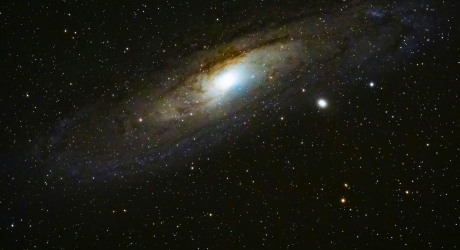The greatest evidence of God before us is His creation. Nature itself and our study of nature, both proclaim the fact that there is one God who, in the infinity of His wisdom, has created and continues to sustain this universe. By ignoring or rejecting this truth, we plunge ourselves into an abyss of murky incomprehension and its attendant evils. The very existence of the universe, with its superb organization and immeasurable meaningfulness, is inexplicable except as having been brought into existence by a Creator - a Being with an infinite intelligence - rather than by a blind force. Among the philosophers of our time, there is a group, per-haps fortunately a small one, which doubts the very existence of every thing, no matter what it may be. It asserts that there exists neither man nor universe. In its nihilism, it likewise rejects the existence of God, even as a remote possibility. As far as this particular brand of agnosticism is concerned, this may be a philosophical point worth considering purely as an abstract exercise in logic, but it is in no way connected with reality. When we think, the very act of thinking gives evidence of our existence.
The great French philosopher and mathematician, Descartes, (1596-1660) founded his philosophy on the precept: "I think, therefore, I am."* ("Je pense, donc je suis.") And from this point, he went on to deduce the existence of God. Our sensory perceptions too give us clear indications of the external existence of material things. If, for example, while walking along the road, we are hit by a stone, we feel pain. This experience establishes that, apart from us and outside of us, there exists a world having its own separate identity. In fact, our minds, through our senses, perceive innumerable objects and register countless sensations and impressions every moment of our waking existence. These acts of cognition are personal experiences which continually reinforce the concept of the world having its own existence. Now, if the philosophical inclinations of a particular individual make him sceptical about the existence of the universe, this is an exceptional case, bearing no relation to the experiences of millions of human beings. It is simply that such an individual is so engrossed in his own private predilections that he has become deaf and blind to common realities.
For the sake of argument, he would have us concede his point, but this would in no way imply that God did not exist. The absurdity of arguments against the existence of commonly accepted things is so patent as to be hardly worth comment. And quite apart from being incomprehensible to the common man, they could never gain credence in the world of learning. Outside the nihilist group, the existence of the universe is accepted as a reality: the moment we admit its existence, we find belief in God inescapable, because the notion of creation having arisen spontaneously out of nothing is quite inconceivable. When everything big or small, has a cause, how can it be believed that such a vast universe has come into existence on its own, and that it has no Creator? In his autobiography, John Stuart Mill, observed that his father had impressed upon him from the first, that the manner in which the world came into existence was a subject on which nothing was known: that the question "Who made me?" cannot be answered, because we have no experience or authentic information from which to answer it, and that any answer only throws the difficulty a step further back, since the question immediately presents itself, "Who made God?"1 This is an old argument much relied upon by atheists, its implication being that if we do accept that there is a Creator of the universe, we shall be compelled to accept this Creator as being eternal. And when God has to be regarded as eternal, why should not the universe itself be regarded as eternal instead? Although such a conclusion is absolutely meaningless - because no such attribute of the universe has come to light so far to justify the conclusion that the universe has come into existence of its own accord - up till the nineteenth century, this misleading argument of the atheists was regarded as the most attractive one.
But now, with the discovery of the second law of the thermodynamics, this argument has lost its validity. Thermodynamics is a branch of science which deals with energy transformation. In particular, it shows the quantitative relations between heat and other forms of energy. The importance of conservation in relation to energy, is expressed in the first law of thermodynamics. The Law of Entropy is the second law of thermodynamics. To understand it, let us take the example of a metallic bar which has been heated at one end but left cold at the other. Heat will instantly begin to flow from the hot end along the length of the bar to the cold end, and will continue to do so until the temperature of the whole bar becomes uniform. The flow of heat will always be in one direction, i.e. from warmer to colder bodies and this flow will never pass spontaneously in the opposite direction, or even haphazardly in just any direction. Other examples of such uniform and non-reversible processes abound in the physical world. For instance, gas always flows towards a vacuum or moves from a point of higher pressure towards that of a lower pressure till its pressure becomes uniform.
It is impossible for any gas to flow in the reverse direction. Such observations provide the basis for the second law of thermodynamics. This law may be stated as follows: All natural or spontaneous processes occurring without the intervention of an external agency are irreversible. The process of one-way movement goes on till a state of equilibrium is reached. On the relevance of these laws to creation, Edward Luther Kessel, an American zoologist, writes: Science clearly shows that the universe could not have existed from all eternity. The law of entropy states that there is a continuous flow of heat from warmer to colder bodies, and that this flow cannot be reversed to pass spontaneously in the opposite direction. Entropy is the ratio of unavailable to available energy, so that it may be said that the entropy of the universe is always increasing. Therefore the universe is headed for a time when the temperature will be universally uniform and there will be no more useful energy.
- 'John Stuart Mill, Autobiography (New York, Columbia University Press, 1960), p. 30. "Consequently there will be no more chemical and physical processes, and life itself will cease to exist. But because life is still going on, and chemical and physical processes are still in progress, it is evident that our universe could not have existed from eternity, else it would have long since run out of useful energy and ground to a halt. Therefore, quite unintentionally, science proves that our universe had a beginning. And in so doing it proves the reality of God, for whatever had a beginning did not begin of itself but demands a Prime Mover, a Creator, a God." I James Jeans has expressed the same view: "The more orthodox scientific view is that the entropy of the universe must forever increase to its final maximum value. It has not yet reached this: we should not be thinking about it if it had. It is still increasing rapidly, and so must have had a beginning; there must have been what we may describe as a 'creation' at a time not infinitely remote."
- There is much physical evidence of this type to prove that the universe has not always existed. On the contrary, its life-span is limited. According to astronomy, the universe is in a state of continuous expansion outwards from the centre of its origin. All of the galaxies and celestial bodies are observably moving away from one another at enormous speeds. This phenomenon can be satisfactorily explained if we presume an initial point of time when all these constituents were an integrated whole, and the release of energy and the process of movement were subsequent developments. On the basis of different observations of a similar type, it is generally held that the universe originated about 5 billion years ago. In theory, the entire universe was formed by an extraordinary explosion from a state of high density and high temperature. This has come to be known as the 'big-bang' theory. To accept that the universe has a limited life-span, and at the same time to deny its having an originator is like accepting that the Taj Mahal has not existed for all eternity, (it having been built some time in the middle of seventeenth century) while denying the existence of an architect or builder, and asserting, on the contrary, that it simply mushroomed all by itself on a particular date. Studies in astronomy show that the number of stars in the sky is as numerous as all of the sand grains on all the sea-shores of our planet, many of the stars being vastly greater in size than our earth, some even being of such enormous girth that they could accommodate lakhs of earths inside them and still have room to spare.
A few of them are even big enough to contain millions and millions of earths. The universe is so vast that an aeroplane flying at the greatest speed imaginable, i.e. at the speed of light, (one lakh and eighty six miles per second) would take about ten billion years to complete just a single trip around the whole universe. Even with such a huge circumference, this universe is not static, but is expanding every moment in all directions. So rapid is this expansion that, according to an estimate by Eddington,* (Sir Arthur Stanley Eddington (1882-1944), noted British physicist and astronomer.) every one thousand three hundred million years, all the distances in this universe are doubled. This means that even our imaginary aeroplane travelling at the speed of light would not ever be able to fly all the way around the universe, because it would never be able to catch up with this unending expansion. This estimation of the vastness of the universe is based on Einstein's theory of relativity. But this is just a mathematician's guess. To tell the truth, man has yet to comprehend the vastness of the universe.
Source: God Arises











